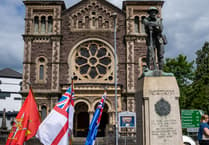At 6pm on Sunday, January 17 Y Plygain will be held in Holy Trinity Church, possibly for the first time ever in that building though it could well have been held in Saint Mary’s Church in earlier times WRITES DAVID ROBERTS.
The word Plygain means "the crowing of the cockerel" because the service was originally held between 3 and 6am on the morning of Christmas Day and originated in the years following the Protestant Reformation.
The Plygain is in all essence an aspect of church worship with an emphasis on carol singing mainly by men and un-accompanied.
The last century saw the demise of the Plygain throughout most of Wales, except in north eastern Montgomeryshire centred on the town of Llanfyllin where the authentic Plygain survives and in some places, such as Pontrobert, is still held at the traditional time.
Symbolic of the light of Christmas, the churches were lit by hundreds of candles, placed wherever one could rest.
There was no structure to the Plygain whatsoever other than an introductory prayer by the incumbent of the parish and a reading from scripture.
The vicar would then announce, "Let the Plygain begin." At this point people would rise in succession and sing individually, or in small groups, a carol until all who wanted to take part had made their contribution.
At this point a group of men would sing Carol Y Swper (the supper carol) and when complete all would share a communal meal. The Plygain is held entirely in Welsh.
There has been a revival of interest in the Plygain in many parts of Wales but the time has changed in most places (even in its heartland) to the evening.
Because very few people outside the valleys of Montgomeryshire know the old carols and are familiar with the tradition, groups of people either volunteer or are selected beforehand to take part. This has the advantage of limiting the length of the service!!
As part of the activities in preparation for the forthcoming National Eisteddfod it was decided by the fund-raising committee that a revival of some traditions would be an important part of activities.
The first such activity was Y Fari Lwyd who was made welcome in many of the taverns of Abergavenny last Saturday.
The Plygain is the second and everybody who wishes to be present and experience something uniquely Welsh is very welcome to attend the service and subsequent refreshments.
Because the service is music based, those who do not speak Welsh will also be able to appreciate the service as indeed people do when attending sung services overseas, especially in Orthodox churches.
Every effort is being made to ensure that what is delivered on Sunday evening will be as close as is practical for a revived form of service, to that which would have been held here during the 17th and 18th centuries.
No charge will be made since the organisers consider that holding the service itself is what is of greatest importance. Voluntary contributions for the refreshments however will be accepted.



